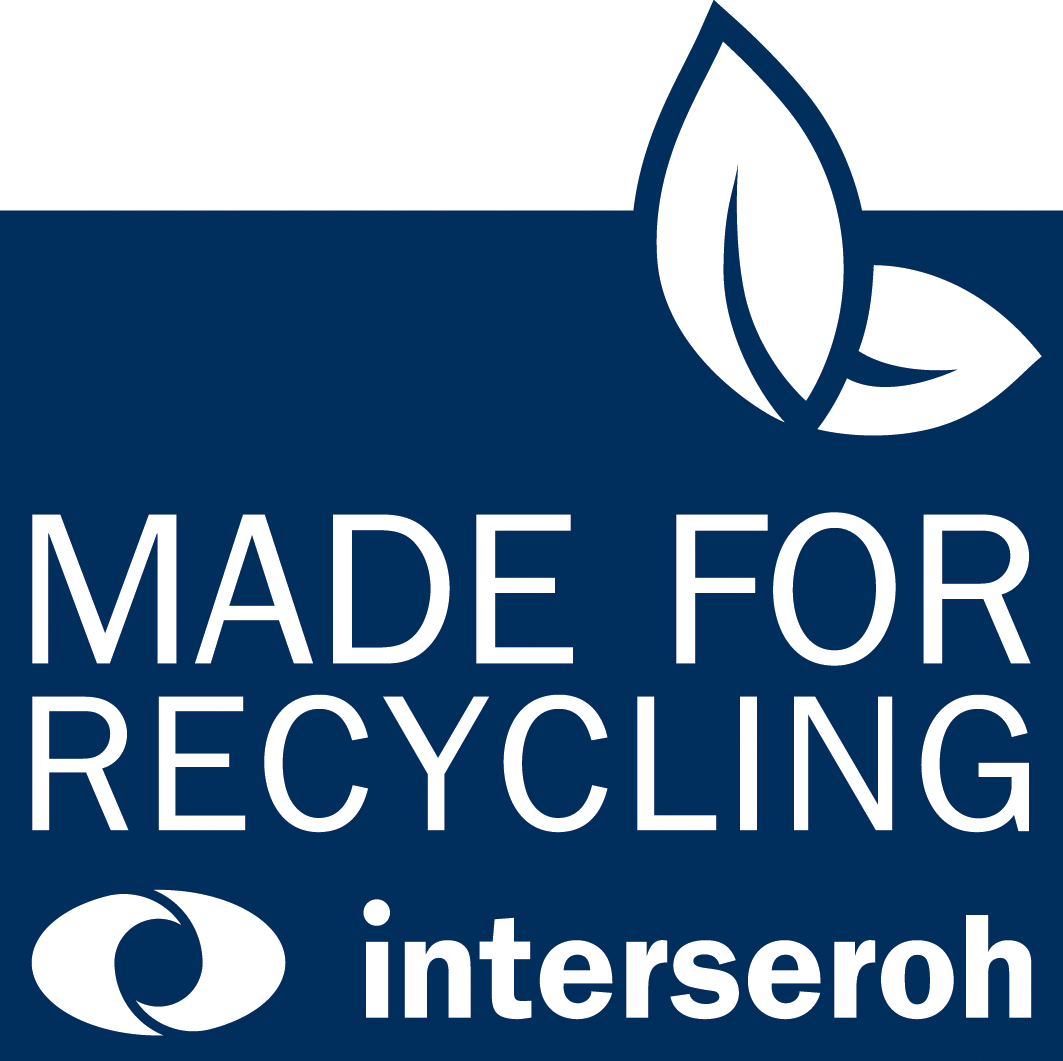

Polypropylene can be readily recycled. It can be sorted and mixed with the existing PP recycle stream. It is more resistant to degradation during mechanical recycling compared with other polymers e.g. PE, which gives much greater potential for future high value products. Most plastic packaging is technically readily recyclable, but there are still large quantities of mixed plastic packaging which is problematic if the industry is to avoid down cycling. A key requirement is therefore the use of mono-materials. A perfect example of this is in wet petfood pouches where complex laminates of PET/Foil/CPP are used. An all-polypropylene version of this structure is now possible.
Certified Recyclable
Working with Interseroh, an Independent German recycling and consulting company, we have confirmed the recyclability of all our uncoated, acrylic coated, Strata and Encore range of BOPP films. All have achieved the ‘Made for recycling’ certification.This certification provides us with independent validation that our polypropylene films are fully recyclable and can be classified as ‘recycle ready’, or recyclable in countries which have the infrastructure to recycle polypropylene.

Interseroh analyse and evaluate the packaging based on sound criteria along the entire after-life processes (collection, sorting, recycling and processing). The result of this analysis is a scale which determines whether the packaging is non-recyclable through to very good.

Collection
Of course, the first stage of recycling is collection where many polymeric packs, e.g. flexibles, have been left behind in favour of more easily collected materials such as PET bottles.
However, attitudes to the collection of valuable flexible films are changing. In June 2021 OPRL (on-pack recycling label, a not-for-profit company) announced that from January 2022 PP films will join PE film in bearing the ‘Recycle with bags at large supermarkets’ label.
The OPRL label scheme is recognised by the UN Environment Programme as international best practice, because it delivers a simple, consistent, and UK-wide reuse and recycling messages on consumer packaging. OPRL members come from all parts of the packaging supply chain, from design to manufacture to brand/retailer.
In store collection points are growing as more UK major retailers such as Tesco, Sainsburys, Coop and other supermarkets join the scheme.
The flexible plastic fund is incentivising flexible plastic recycling as quickly as possible.
Chemical and Mechanical Recycling
Chemical recycling of polypropylene is a rapidly developing technology which reduces the use of fossil raw materials and is food contact compliant, while maintaining all the properties of fossil-based films. However, from a Global Warming Potential perspective, it does not have as good a carbon footprint as mechanical recycled polypropylene.
The need to include recycled content into BOPP products is a serious challenge as food compliant mechanical recyclate is not currently available and PP cannot be classed as a functional barrier to many of the current contaminants present in recycled PP, i.e., even putting the post-consumer recyclate (PCR) into a buried layer in the film will not make it food compliant.
Chemical recycling unfortunately is not the answer to all the problems. There is a very limited amount of material available, although this is growing, and is currently expensive. This will improve with increased competition and economies of scale. The holy grail for the industry is to get a more cost effective, food compliant route from mechanical recycling which will have a significantly reduced carbon footprint than that of a chemical recycled polypropylene.
Innovia has product options for BOPP flexible films with both chemically recycled or mechanically recycled polymers under the Encore range.
Designing for Recyclability
All aspects of pack design need to be considered carefully to enhance recyclability.
In the USA the Association of Plastics Recyclers (APR) have produced a design guide for plastics recyclability. This is to help package designers measure each aspect of a package design against industry-accepted criteria to ensure it is truly recycling compatible including labels. The guide highlights the benefits of using compatible materials and adhesives to improve recyclability.
Polypropylene (PP) labels on polyester (PET) containers and bottles with wash off adhesives has been identified as their preferred option, whilst paper labels have been identified as detrimental/problematic. PP has a density that is less than water which enables PP pressure sensitive labels to float in float/sink reprocessing, a system that is fundamental to recyclers. Innovia Films is the market leader for PP pressure sensitive facestock films with a wide range of products.
Our Product Managers, Global Sales and Technical Services Teams are very
knowledgeable and can assist our customers to make the right choices to improve
their pack formats to increase recyclability.